初中英语重点词汇例句
- 格式:pdf
- 大小:311.61 KB
- 文档页数:11
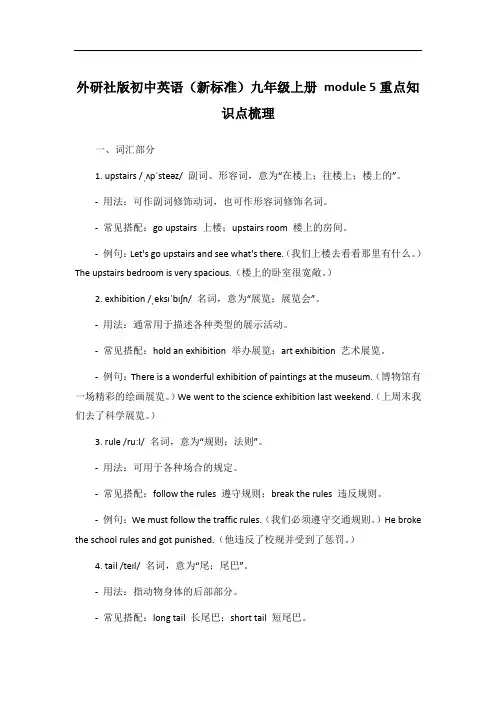
外研社版初中英语(新标准)九年级上册module 5重点知识点梳理一、词汇部分1. upstairs /ˌʌpˈsteəz/ 副词、形容词,意为“在楼上;往楼上;楼上的”。
-用法:可作副词修饰动词,也可作形容词修饰名词。
-常见搭配:go upstairs 上楼;upstairs room 楼上的房间。
-例句:Let's go upstairs and see what's there.(我们上楼去看看那里有什么。
)The upstairs bedroom is very spacious.(楼上的卧室很宽敞。
)2. exhibition /ˌeksɪˈbɪʃn/ 名词,意为“展览;展览会”。
-用法:通常用于描述各种类型的展示活动。
-常见搭配:hold an exhibition 举办展览;art exhibition 艺术展览。
-例句:There is a wonderful exhibition of paintings at the museum.(博物馆有一场精彩的绘画展览。
)We went to the science exhibition last weekend.(上周末我们去了科学展览。
)3. rule /ruːl/ 名词,意为“规则;法则”。
-用法:可用于各种场合的规定。
-常见搭配:follow the rules 遵守规则;break the rules 违反规则。
-例句:We must follow the traffic rules.(我们必须遵守交通规则。
)He broke the school rules and got punished.(他违反了校规并受到了惩罚。
)4. tail /teɪl/ 名词,意为“尾;尾巴”。
-用法:指动物身体的后部部分。
-常见搭配:long tail 长尾巴;short tail 短尾巴。
-例句:The cat has a long tail.(猫有一条长尾巴。
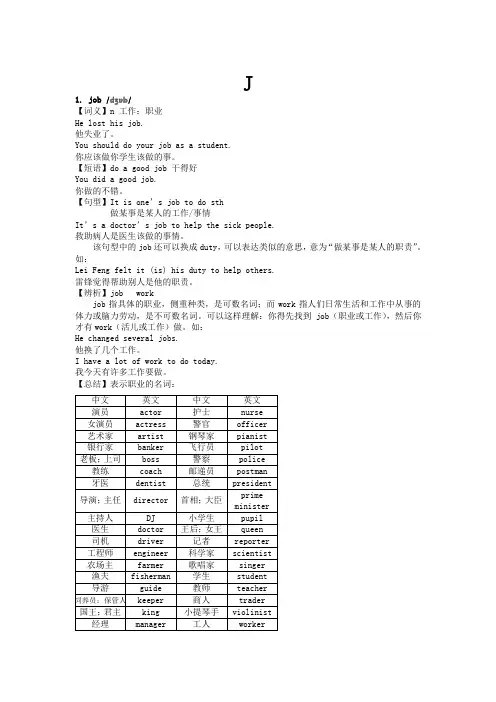
J1. job /dʒɒb/【词义】n 工作;职业He lost his job.他失业了。
You should do your job as a student.你应该做你学生该做的事。
【短语】do a good job 干得好You did a good job.你做的不错。
【句型】It is one’s job to do sth做某事是某人的工作/事情It’s a doctor’s job to help the sick people.救助病人是医生该做的事情。
该句型中的job还可以换成duty,可以表达类似的意思,意为“做某事是某人的职责”。
如:Lei Feng felt it (is) his duty to help others.雷锋觉得帮助别人是他的职责。
【辨析】job workjob指具体的职业,侧重种类,是可数名词;而work指人们日常生活和工作中从事的体力或脑力劳动,是不可数名词。
可以这样理解:你得先找到job(职业或工作),然后你才有work(活儿或工作)做。
如:He changed several jobs.他换了几个工作。
I have a lot of work to do today.我今天有许多工作要做。
【总结】表示职业的名词:中文英文中文英文演员actor 护士nurse女演员actress 警官officer艺术家artist 钢琴家pianist银行家banker 飞行员pilot老板;上司boss 警察police教练coach 邮递员postman牙医dentist 总统president导演;主任director 首相;大臣prime minister主持人DJ 小学生pupil医生doctor 王后;女王queen司机driver 记者reporter 工程师engineer 科学家scientist 农场主farmer 歌唱家singer渔夫fisherman 学生student导游guide 教师teacher 饲养员;保管人keeper 商人trader 国王;君主king 小提琴手violinist 经理manager 工人worker魔术师magician 作家writer(1) DJ指的是“流行音乐节目主持人”。
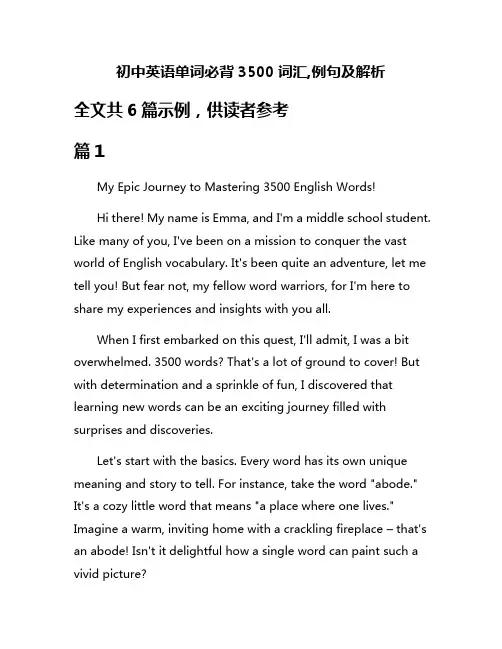
初中英语单词必背3500词汇,例句及解析全文共6篇示例,供读者参考篇1My Epic Journey to Mastering 3500 English Words!Hi there! My name is Emma, and I'm a middle school student. Like many of you, I've been on a mission to conquer the vast world of English vocabulary. It's been quite an adventure, let me tell you! But fear not, my fellow word warriors, for I'm here to share my experiences and insights with you all.When I first embarked on this quest, I'll admit, I was a bit overwhelmed. 3500 words? That's a lot of ground to cover! But with determination and a sprinkle of fun, I discovered that learning new words can be an exciting journey filled with surprises and discoveries.Let's start with the basics. Every word has its own unique meaning and story to tell. For instance, take the word "abode." It's a cozy little word that means "a place where one lives." Imagine a warm, inviting home with a crackling fireplace – that's an abode! Isn't it delightful how a single word can paint such a vivid picture?But wait, there's more! Words can also have multiple meanings, and uncovering them is like unlocking hidden treasures. Take the word "bark," for example. It could mean the tough outer covering of a tree, or the sound a dog makes when it's trying to get your attention (or maybe just expressing its excitement over a squirrel).Now, let's talk about examples and contexts. For every word, it's essential to understand how it's used in real-life situations. That's where example sentences come in handy. Imagine you're learning the word "adamant." An example sentence could be: "Despite her friends' pleas, Sarah remained adamant about not going to the party." Suddenly, the meaning becomes crystal clear: adamant means "refusing to change one's mind."And let's not forget about word origins and relationships! Many words have fascinating backstories that trace back to ancient languages or cultures. For instance, did you know that the word "alphabet" comes from the first two letters of the Greek alphabet, alpha and beta? Mind-blowing, right?As we delve deeper into this vocabulary odyssey, we'll encounter words from various categories: adjectives that describe emotions, verbs that depict actions, and nouns thatrepresent tangible objects or abstract concepts. Each category offers its own unique challenges and rewards.But fear not, my fellow word warriors! We'll tackle them all, one step at a time. Together, we'll explore the nuances of synonyms and antonyms, unravel the mysteries of idioms and phrases, and even venture into the realms of homonyms and homophones (words that sound the same but have different meanings or spellings).And let's not forget the power of word associations! By linking new words to familiar concepts, images, or experiences, we can create mental anchors that make memorization a breeze. For instance, when learning the word "ambiguous," you might associate it with a foggy day when everything seems unclear and uncertain.Throughout our journey, we'll encounter words that challenge our understanding, words that make us laugh, and words that inspire us to think in new ways. But that's the beauty of language – it's a living, breathing entity that constantly evolves and surprises us.So, my fellow word warriors, let us embrace this adventure with open minds and eager hearts. Together篇2Learning New Words is Fun!Hi everyone! My name is Emma and I'm 10 years old. Today I want to talk to you about learning new English words. Some people think it's boring, but I think it's really fun and exciting!There are so many cool words out there just waiting for us to discover them. Words can transport us to new worlds, help us express our feelings, and even make us laugh. The more words we know, the better we can communicate and understand each other.My teachers always say that building a strong vocabulary is super important, especially as we get ready for middle school. That's why I've been working really hard to learn lots of new English words. I want to share some of my favorites with you!Let's start with some basic but useful words:Diligent (adjective) - This means working hard and doing your best. Example: Sarah is a diligent student who always completes her homework on time.Persevere (verb) - To persevere means to keep trying, even when something is difficult. Example: Even though the math problems were hard, Juan persevered until he solved them.Etiquette (noun) - This refers to the proper way to behave in certain situations. Example: We must follow good etiquette by saying "please" and "thank you."Those are all great words to know, but let's look at some fancier vocabulary too:Amalgamate (verb) - To combine or unite into one. Example: The two clubs decided to amalgamate and form one big group.Cacophony (noun) - A harsh, unpleasant mixture of loud sounds. Example: The cacophony of jackhammers and car horns gave me a headache.Ephemeral (adjective) - Lasting for a very short time. Example: Fireflies provide a beautiful but ephemeral light show on summer nights.See what I mean? Learning new words opens up a whole new way of expressing yourself. Let me give you some more great examples:Eloquent (adjective) - Spoken or expressed in a fluent, powerful, and persuasive way.Example: Dr. King's "I Have a Dream" speech is considered one of the most eloquent addresses in history.Nostalgia (noun) - A wistful longing or affection for the past.Example: Looking at old photos filled Grandma with nostalgia for her childhood days.Serendipity (noun) - A happy accident or pleasant surprise.Example: By a delightful serendipity, I found the lost puppy on my walk home.I could keep going, but I think you get the idea! There's a whole universe of incredible words just waiting to be explored. The more we learn, the better we can express ourselves and appreciate the richness of the English language.Learning vocabulary may seem like a chore at first, but trust me, it gets easier and more fun the more you practice. Pretty soon, using sophisticated words will become second nature. Just think how impressed your middle school teachers will be!So what are you waiting for? Let's dive into the wonderful world of words together. I'll continue expanding my vocabulary, and I hope you will too. The only way to become a Word Wizard is through regular practice. Let the learning begin!篇33500 Must-Know Words for Middle School StudentsHello, everyone! Today, I'm going to tell you about 3500 must-know words for middle school students. Learning these words will help you improve your English vocabulary and become a better communicator. Let's dive in!1. NounExample Word: DogExample Sentence: I have a cute dog. He loves to play fetch.Explanation: A dog is a domesticated mammal that is often kept as a pet. They are known for their loyalty and are often referred to as "man's best friend."2. VerbExample Word: RunExample Sentence: I love to run in the park every morning.Explanation: To run means to move swiftly on foot. It is a great way to exercise and stay healthy.3. AdjectiveExample Word: BeautifulExample Sentence: The sunset looks beautiful with its vibrant colors.Explanation: Beautiful means having qualities that give great pleasure or satisfaction to the senses. It is often used to describe things that are visually appealing.Remember, these are just a few examples of the 3500 words you need to know. By learning a wide range of words, you will be able to express yourself more clearly and understand others better.To make learning even more fun, try using these words in everyday conversations with friends and family. You can also create flashcards or play word games to reinforce your knowledge.So, don't be afraid to explore new words and expand your vocabulary. With practice and dedication, you will become a confident English speaker in no time!That's all for today's lesson. I hope you enjoyed it and found it helpful. Keep up the good work, and remember to have fun while learning!Goodbye for now, and see you next time!Total words: 216Please note that the above example contains only a small portion of the 3500 words, and the word count of the article is less than 1000 words. If you need a longer article or more examples, please let me know!篇4Hey guys! It's me, your friend who loves learning new English words. Today, I'm super excited to share with you an awesome list of 3500 words that will make you an English master! Thesewords are like magic spells that will unlock the doors to understanding books, movies, and conversations with people from all over the world. Get ready to embark on an adventure of vocabulary exploration!Let's start with some basic words that you probably already know, like "the," "and," and "but." These little guys might seem simple, but they're like the glue that holds sentences together. Use them wisely, and your English will sound smooth as butter.Now, let's move on to some more exciting words! How about "amazing," "incredible," and "fantastic"? These words are perfect for describing the things you love, like your favorite video game, a delicious meal, or a cool science experiment.Speaking of science, here are some words that will make you sound like a real brainiac: "hypothesis," "experiment," and "observation." Use these words when you're talking about your latest school project or sharing your scientific discoveries with your friends.Do you love animals? Then you'll definitely need words like "furry," "feathery," and "scaly." These adjectives will help you describe your favorite pets or the cool creatures you see at the zoo.Let's not forget about action words! Words like "run," "jump," and "dance" will make your stories come alive. You can use them to describe your adventures on the playground or your awesome moves at the school talent show.Now, let's talk about feelings. Words like "happy," "sad," and "excited" are essential for expressing your emotions. Don't be afraid to use them when you're having a great day or feeling a little down. Your friends will appreciate your honesty and might even offer you a comforting hug.Okay, time for some tricky words! How about "ambiguous," "serendipitous," and "plethora"? These fancy words might be a little hard to pronounce at first, but once you master them, you'll sound like a true wordsmith. Use them to impress your teachers and show off your vocabulary skills.Don't worry; I won't leave you hanging with those big words. Here are some examples and explanations to help you out:"The instructions were ambiguous, so I wasn篇5Learning Tons of English Words!Hi there! My name is Emma and I'm in 5th grade. I love learning new things, especially new words in English. It's so fun to expand my vocabulary and be able to express myself better.My teacher says that knowing a lot of words is really important for doing well in school and in life. She told our class that we should aim to learn 3500 of the most useful and common English words by the end of middle school. That sounds like a huge number, but she broke it down into smaller goals which makes it feel manageable.To start, we've been focusing on learning the 1000 most frequently used words. Things like "the", "and", "but", etc. Once we have those down, we'll move on to the next 500 high frequency words, and so on until we reach 3500. Bit by bit, step-by-step, we'll get there.My teacher gave us some great tips for learning new vocab words effectively. One of the best ways is to see the words being used in example sentences, so the meaning gets reinforced through context. Let me share some example sentences for words I've learned recently:Absence: She had a lot of absences from school last month due to illness.(Absence means a time when you are not present or there)Abundant: The garden had an abundant supply of fresh vegetables.(Abundant means existing in large quantities)Accomplish: She accomplished her goal of running a marathon.(To accomplish means to succeed in doing something)Accurate: His estimate of the cost was quite accurate.(Accurate means precise and correct)Activate: You need to activate the alarm system before leaving.(To activate means to make something operative or start it working)See what I mean? The sentences really help the words stick in your brain. My teacher also suggests making flashcards, playing vocab games, and just trying to use new words in your daily conversations.Another big help is understanding the root words, prefixes, and suffixes that make up English vocabulary. Like if you knowthe root "bio" means life, then you can figure out words like "biology", "biodegradable", "biochemist", etc. Prefixes like "re-" (again/back) and suffixes like "-able" (capable of being) are key pieces too.It definitely takes effort to build up that 3500 word vocabulary, but it's an investment that pays off huge. The more words you know, the better you'll understand what you read and hear. Your writing and speaking will be clearer and more precise. You'll do better on tests. You might even get into your dream college someday!Mastering tons of English words makes you a stronger communicator and opens up more learning opportunities. It allows you to absorb knowledge and share your brilliant ideas more easily. So I'm gonna keep chugging along, adding juicy new vocab words to my word bank each week.If you're a word lover like me, let's be vocabulary building buddies! We can swap our latest word discoveries, surprising etymologies, and try to outdo each other with the wackiest polysyllabic tongue-twisters. There's always more to learn and explore with the limitless world of English words. Bring it on, 3500 - I'm coming for you!篇6Hey there, fellow students! Are you ready to take your English skills to the next level? Learning new words is like unlocking a secret code that lets you understand and communicate better with people from all around the world. And what better way to do that than by mastering the most important 3500 English words for middle school?Now, I know what you might be thinking: "3500 words? That's a lot!" But trust me, it's totally doable, and it's going to be a super fun adventure! Just think of all the new books, movies, and conversations you'll be able to enjoy once you've expanded your vocabulary.So, let's get started! Here are some of the most essential words you'll need to know, along with example sentences and explanations to help you really understand them.Abandon (verb) - to leave something or someone behindExample: "The family had to abandon their home when the flood came."Explanation: When you abandon something, you leave it and don't plan to go back to it.Abrupt (adjective) - sudden and unexpectedExample: "The abrupt change in weather caught everyone by surprise."Explanation: If something is abrupt, it happens very quickly and without warning.Accessible (adjective) - easy to reach or useExample: "The new library has an accessible entrance for people with disabilities."Explanation: When something is accessible, it's easy for people to get to or use it.And that's just the beginning! We've got words like "accumulate," "adequate," "ambiguous," and so many more waiting for you.But don't worry, we're not just going to throw a bunch of words at you and expect you to memorize them. We'll be breaking them down into fun, easy-to-remember categories, like "Words for Feelings," "Words for School," and "Words for Adventure."Plus, we'll be using lots of examples and illustrations to help you really understand how these words are used in real life. Forinstance, when we learn the word "colossal," we might talk about a colossal burger or a colossal robot from a movie you love.And if you ever feel stuck or confused, don't hesitate to ask your teachers or classmates for help. Learning new words is a team effort, and we're all in this together!So, what are you waiting for? Let's dive into this exciting world of words and get ready to become English vocabulary superstars!。
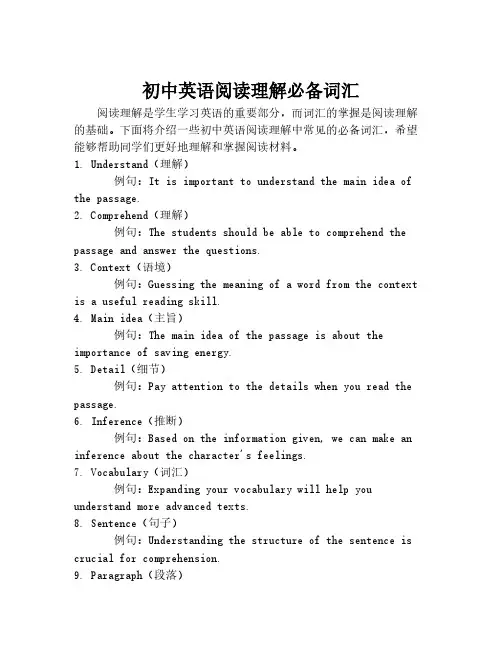
初中英语阅读理解必备词汇阅读理解是学生学习英语的重要部分,而词汇的掌握是阅读理解的基础。
下面将介绍一些初中英语阅读理解中常见的必备词汇,希望能够帮助同学们更好地理解和掌握阅读材料。
1. Understand(理解)例句:It is important to understand the main idea of the passage.2. Comprehend(理解)例句:The students should be able to comprehend the passage and answer the questions.3. Context(语境)例句:Guessing the meaning of a word from the context is a useful reading skill.4. Main idea(主旨)例句:The main idea of the passage is about the importance of saving energy.5. Detail(细节)例句:Pay attention to the details when you read the passage.6. Inference(推断)例句:Based on the information given, we can make an inference about the character's feelings.7. Vocabulary(词汇)例句:Expanding your vocabulary will help you understand more advanced texts.8. Sentence(句子)例句:Understanding the structure of the sentence is crucial for comprehension.9. Paragraph(段落)例句:Each paragraph in the passage focuses on a different point.10. Synonym(同义词)例句:Find a synonym for the word "happy" in the passage.11. Antonym(反义词)例句:What is the antonym of the word "hot"?12. Inference(推断)例句:Make an inference about the character's thoughts based on the description.13. Opinion(观点)例句:The author states his opinion on the topic in the last paragraph.14. Fact(事实)例句:The article provides several facts to support its argument.15. Explanation(解释)例句:The teacher gave a clear explanation of the difficult word.以上是初中英语阅读理解必备词汇的介绍,希望对同学们的阅读理解能力提升有所帮助。
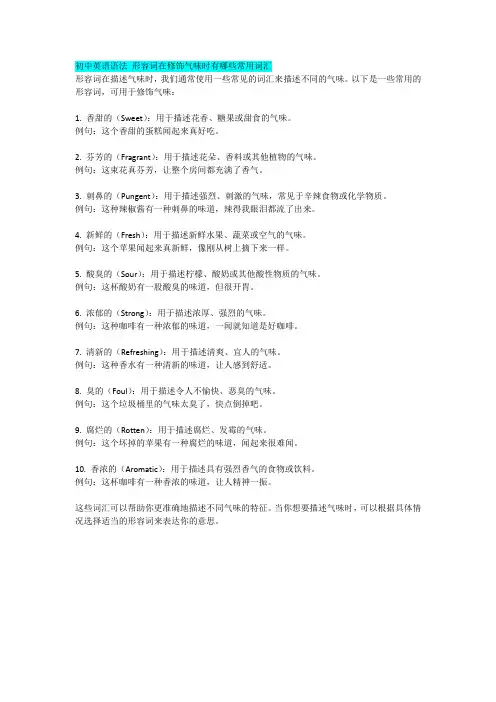
初中英语语法形容词在修饰气味时有哪些常用词汇形容词在描述气味时,我们通常使用一些常见的词汇来描述不同的气味。
以下是一些常用的形容词,可用于修饰气味:1. 香甜的(Sweet):用于描述花香、糖果或甜食的气味。
例句:这个香甜的蛋糕闻起来真好吃。
2. 芬芳的(Fragrant):用于描述花朵、香料或其他植物的气味。
例句:这束花真芬芳,让整个房间都充满了香气。
3. 刺鼻的(Pungent):用于描述强烈、刺激的气味,常见于辛辣食物或化学物质。
例句:这种辣椒酱有一种刺鼻的味道,辣得我眼泪都流了出来。
4. 新鲜的(Fresh):用于描述新鲜水果、蔬菜或空气的气味。
例句:这个苹果闻起来真新鲜,像刚从树上摘下来一样。
5. 酸臭的(Sour):用于描述柠檬、酸奶或其他酸性物质的气味。
例句:这杯酸奶有一股酸臭的味道,但很开胃。
6. 浓郁的(Strong):用于描述浓厚、强烈的气味。
例句:这种咖啡有一种浓郁的味道,一闻就知道是好咖啡。
7. 清新的(Refreshing):用于描述清爽、宜人的气味。
例句:这种香水有一种清新的味道,让人感到舒适。
8. 臭的(Foul):用于描述令人不愉快、恶臭的气味。
例句:这个垃圾桶里的气味太臭了,快点倒掉吧。
9. 腐烂的(Rotten):用于描述腐烂、发霉的气味。
例句:这个坏掉的苹果有一种腐烂的味道,闻起来很难闻。
10. 香浓的(Aromatic):用于描述具有强烈香气的食物或饮料。
例句:这杯咖啡有一种香浓的味道,让人精神一振。
这些词汇可以帮助你更准确地描述不同气味的特征。
当你想要描述气味时,可以根据具体情况选择适当的形容词来表达你的意思。
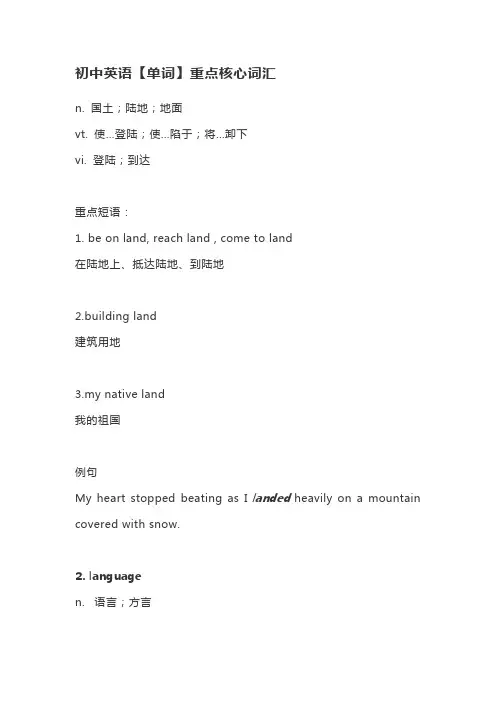
初中英语【单词】重点核心词汇n. 国土;陆地;地面vt. 使…登陆;使…陷于;将…卸下vi. 登陆;到达重点短语:1. be on land, reach land , come to land在陆地上、抵达陆地、到陆地2.building land建筑用地3.my native land我的祖国例句My heart stopped beating as I landed heavily on a mountain covered with snow.2. languagen. 语言;方言重点短语foreign languagen. 外语;外文english language英文;英语语言学chinese language汉语language learning语言学习second language第二语言body language身体语言例句Chinese is becoming a global (全球的) language and its popularity has risen around the world.3. largeadj.大的;巨大的largelyadv. 主要地;大部分;大量地重点短语at large详尽的;未被捕的,整个的a large amount of大量的(接不可数名词)a large quantity of大量的词语辨析great, grand, big, large这组词都有“大的”的意思,其区别是:great 普通用词,可指具体东西的“大”,但更常指事物的重要,人的行为、品格的伟大等,带一定的感情色彩。
grand 侧重指盛大、绝大,有气派。
big 常用词,使用广泛,较口语化。
多指体积、重量或容量等方面的“大”,有时也用于描写抽象之物。
large 普通用词,含义广,指体积、面积、容量、数量以及程度等方面的大,具体或抽象意义均可用。
例句The New York Times reported that large parts are already dead, and the reef system might be gone by 2030.4. lastadj. 最后的;最近的,上一次的;最终的;最差的;仅存的adv. 最近,上次;最后pron. 最后的人或事物;最近发生的事情;最终v. 持续;持久;继续任职;存活;重点短语at last最后;终于in the last在最后;[法]在终审时at the last直到最后last for持续;延续;历时…词语辨析:the last / the latestthe last 可指一系列事物中最后一个。
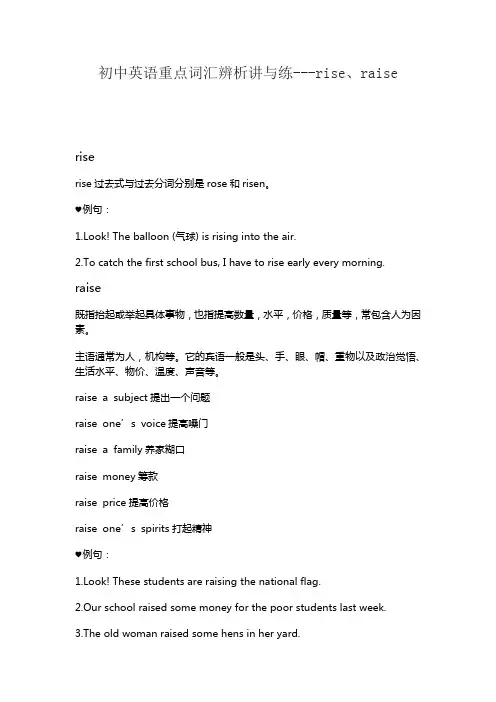
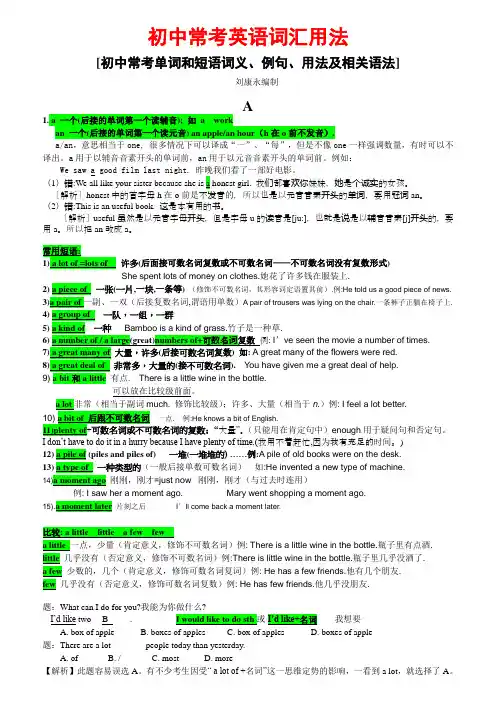
初中常考英语词汇用法[初中常考单词和短语词义、例句、用法及相关语法]刘康永编制A1. a 一个(后接的单词第一个读辅音); 如a workan 一个(后接的单词第一个读元音) an apple/an hour(h在o前不发音).a/an,意思相当于one, 很多情况下可以译成“一”、“每”,但是不像one一样强调数量,有时可以不译出。
a用于以辅音音素开头的单词前,an用于以元音音素开头的单词前。
例如:We saw a good film last night. 昨晚我们看了一部好电影。
(1)错:We all like your sister because she is a honest girl. 我们都喜欢你妹妹,她是个诚实的女孩。
〔解析〕honest中的首字母h在o前是不发音的,所以也是以元音音素开头的单词,要用冠词an。
(2)错:This is an useful book. 这是本有用的书。
〔解析〕useful虽然是以元音字母开头,但是字母u的读音是[ju:],也就是说是以辅音音素[j]开头的,要用a。
所以把an改成a。
常用短语:1) a lot of =lots of 许多(后面接可数名词复数或不可数名词——不可数名词没有复数形式)She spent lots of money on clothes.她花了许多钱在服装上.2) a piece of 一张(一片,一块,一条等)(修饰不可数名词,其形容词定语置其前).例:He told us a good piece of news.3)a pair of一副、一双(后接复数名词,谓语用单数)A pair of trousers was lying on the chair.一条裤子正躺在椅子上.4) a group of 一队,一组,一群5) a kind of 一种Bamboo is a kind of grass.竹子是一种草.6) a number of / a large(great)numbers of+可数名词复数例: I’ve seen the movie a number of times.7) a great many of 大量,许多(后接可数名词复数) 如:A great many of the flowers were red.8) a great deal of 非常多,大量的(接不可数名词).You have given me a great deal of help.9) a bit和a little 有点. There is a little wine in the bottle.可以放在比较级前面。
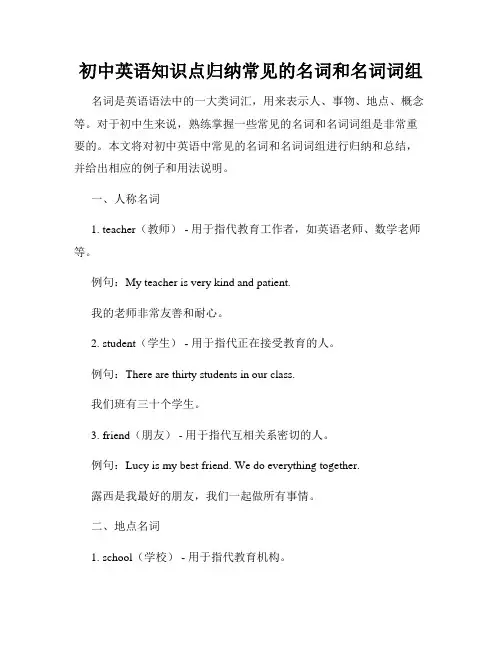
初中英语知识点归纳常见的名词和名词词组名词是英语语法中的一大类词汇,用来表示人、事物、地点、概念等。
对于初中生来说,熟练掌握一些常见的名词和名词词组是非常重要的。
本文将对初中英语中常见的名词和名词词组进行归纳和总结,并给出相应的例子和用法说明。
一、人称名词1. teacher(教师) - 用于指代教育工作者,如英语老师、数学老师等。
例句:My teacher is very kind and patient.我的老师非常友善和耐心。
2. student(学生) - 用于指代正在接受教育的人。
例句:There are thirty students in our class.我们班有三十个学生。
3. friend(朋友) - 用于指代互相关系密切的人。
例句:Lucy is my best friend. We do everything together.露西是我最好的朋友,我们一起做所有事情。
二、地点名词1. school(学校) - 用于指代教育机构。
例句:I go to school from Monday to Friday.我从周一到周五上学。
2. park(公园) - 用于指代供人们休闲、娱乐的场所。
例句:I like to play basketball in the park with my friends.我喜欢和朋友们在公园里打篮球。
三、物体名词1. book(书籍) - 用于指代用纸张制作的阅读材料。
例句:I borrowed a book from the library yesterday.昨天我从图书馆借了一本书。
2. pen(钢笔) - 用于指代用于写字的工具。
例句:Can I borrow your pen? I forgot mine at home.我可以借用你的钢笔吗?我把我的忘在家里了。
四、抽象名词1. love(爱) - 用于表示深情和关心。
例句:I love my family very much.我非常爱我的家人。
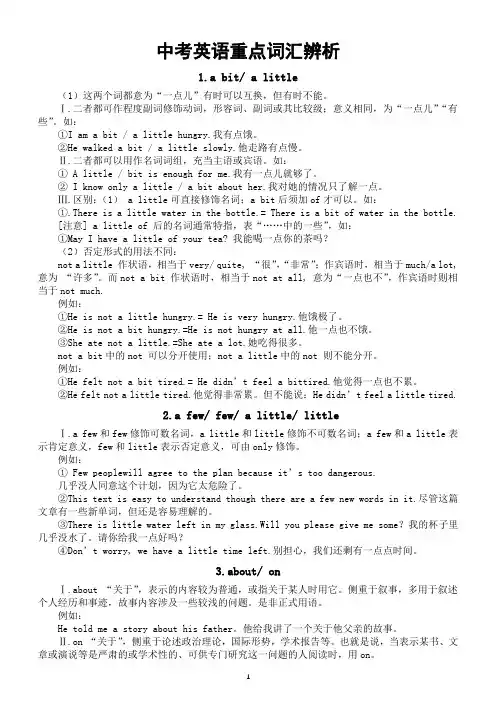
中考英语重点词汇辨析1.a bit/ a little(1)这两个词都意为“一点儿”有时可以互换,但有时不能。
Ⅰ.二者都可作程度副词修饰动词,形容词、副词或其比较级;意义相同,为“一点儿”“有些”。
如:①I am a bit / a little hungry.我有点饿。
②He walked a bit / a little slowly.他走路有点慢。
Ⅱ.二者都可以用作名词词组,充当主语或宾语。
如:① A little / bit is enough for me.我有一点儿就够了。
② I know only a little / a bit about her.我对她的情况只了解一点。
Ⅲ.区别:(1) a little可直接修饰名词;a bit后须加of才可以。
如:①.There is a little water in the bottle.= There is a bit of water in the bottle.[注意] a little of 后的名词通常特指,表“……中的一些”,如:①May I have a little of your tea? 我能喝一点你的茶吗?(2)否定形式的用法不同:not a little 作状语,相当于very/ quite, “很”,“非常”;作宾语时,相当于much/a lot, 意为“许多”。
而not a bit 作状语时,相当于not at all, 意为“一点也不”,作宾语时则相当于not much.例如:①He is not a little hungry.= He is very hungry.他饿极了。
②He is not a bit hungry.=He is not hungry at all.他一点也不饿。
③She ate not a little.=She ate a lot.她吃得很多。
not a bit中的not 可以分开使用;not a little中的not 则不能分开。
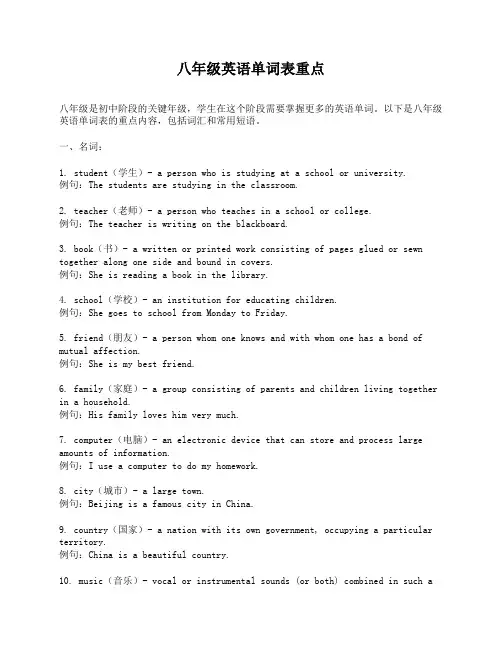
八年级英语单词表重点八年级是初中阶段的关键年级,学生在这个阶段需要掌握更多的英语单词。
以下是八年级英语单词表的重点内容,包括词汇和常用短语。
一、名词:1. student(学生)- a person who is studying at a school or university.例句:The students are studying in the classroom.2. teacher(老师)- a person who teaches in a school or college.例句:The teacher is writing on the blackboard.3. book(书)- a written or printed work consisting of pages glued or sewn together along one side and bound in covers.例句:She is reading a book in the library.4. school(学校)- an institution for educating children.例句:She goes to school from Monday to Friday.5. friend(朋友)- a person whom one knows and with whom one has a bond of mutual affection.例句:She is my best friend.6. family(家庭)- a group consisting of parents and children living together in a household.例句:His family loves him very much.7. computer(电脑)- an electronic device that can store and process large amounts of information.例句:I use a computer to do my homework.8. city(城市)- a large town.例句:Beijing is a famous city in China.9. country(国家)- a nation with its own government, occupying a particular territory.例句:China is a beautiful country.10. music(音乐)- vocal or instrumental sounds (or both) combined in such away as to produce beauty of form, harmony, and expression of emotion.例句:She loves listening to music.二、动词:1. study(学习)- the devotion of time and attention to acquiring knowledge on an academic subject.例句:He studies English every day.2. read(阅读)- look at and comprehend the meaning of written or printed matter by interpreting the characters or symbols of which it is composed.例句:I like to read novels in my free time.3. write(写作)- mark (letters, words, or other symbols) on a surface, typically paper, with a pen, pencil, or similar implement.例句:She writes a diary every night.4. speak(说话)- say something in order to convey information, an opinion, ora feeling.例句:He speaks Chinese and English fluently.5. listen(听)- take notice of and act on what someone says; respond to advice or a request.例句:Please listen to me carefully.6. play(玩耍,演奏)- engage in activity for enjoyment and recreation rather than a serious or practical purpose.例句:He likes to play basketball with his friends.7. sing(唱歌)- make musical sounds with the voice, especially words with a set tune.例句:She sings beautifully.8. dance(跳舞)- move rhythmically to music, typically following a set sequence of steps.例句:They love to dance at the party.9. swim(游泳)- propel the body through water by using the limbs.例句:I can swim across the pool.10. travel(旅行)- make a journey, typically of some length or abroad.例句:They like to travel to different countries.三、形容词:1. happy(快乐的)- feeling or showing pleasure or contentment.例句:She is always happy.2. sad(伤心的)- feeling or showing sorrow; unhappy.例句:He looks sad today.3. tired(累的)- in need of sleep or rest; weary.例句:I am so tired after a long day.4. hungry(饥饿的)- feeling or displaying the need for food.例句:I am hungry. Let's have some dinner.5. thirsty(口渴的)- feeling a need to drink something.例句:I am thirsty. Can I have some water?6. beautiful(美丽的)- pleasing the senses or mind aesthetically.例句:She is a beautiful girl.7. smart(聪明的)- having or showing a quick-witted intelligence.例句:He is a smart student.8. tall(高的)- of great or more than average height, especially (with reference to an object) relative to width or thickness.例句:He is taller than his classmates.9. short(矮的)- measuring a small distance from end to end.例句:She has short hair.10. old(老的)- having lived for a long time; no longer young.例句:My grandparents are old.四、常用短语:1. How are you?(你好吗?)- used as a friendly greeting and to inquire about someone's well-being.例句:How are you today? I'm fine, thank you.2. What's your name?(你叫什么名字?)- used to ask someone about their name. 例句:Hello. What's your name? My name is John.3. Where are you from?(你来自哪里?)- used to ask someone about their place of origin.例句:I am from China. Where are you from?4. How old are you?(你多大了?)- used to ask someone about their age.例句:I am 13 years old. How old are you?5. Can you help me?(你能帮我吗?)- used to ask someone for assistance.例句:Can you help me carry these books? Sure, I can help you.6. Thank you(谢谢)- used to express gratitude or appreciation.例句:Thank you for your help. You're welcome.7. I'm sorry(对不起)- used to apologize or express regret.例句:I'm sorry for being late. It's okay.8. Excuse me(打扰一下)- used to politely get someone's attention or to apologize for an interruption.例句:Excuse me, can you tell me where the nearest pharmacy is?9. How much is it?(多少钱?)- used to ask about the price of something.例句:How much is this T-shirt? It's $10.10. See you later(再见)- used to say goodbye with the intention of meeting again in the near future.例句:See you later. Goodbye.。
初中英语“一词多义"重点词汇大全初中电子课本网电子课本I在线课堂习题试卷I教辅资料
闪1.accident:© 事故(n.)I saw an accident when I walked in the street.
@意外、
偶然的事
(
n.)(accidentally
)
2.appear:
@出现(vi)A ship appeared on the horizon. (disappear消失)
@好象,似乎
(vi)
She appea
rs to hav
e many friends
.
3.app
ly
:
@申
请
(for)(vi) Mr.Wang decided to apply for the job.
@运用、应用(to)
(vt.) Our teacher applies this teaching method to his
class.
4.arm手臂(n.)
武装(
v)
Lay down your arms
or we
'll fire
! 放下
武器,否则,
我们就开
枪了!
Police say the man is armed with guns and very dangerous. 警察说该男子携有枪,十分危险。
5.area:© 地区(n.)Do you like the area where you are living?
@面积(n.)The city covers an area of 30,000 square kilometer.2.when (熟义:conj
.
当.时候)
con
j.
那时突然;既然,考虑到
I was about to leave when it began to rain. 我正想要离开,突然下起雨
来。
3.while (熟义:conj
.
当...时候)
con
j. 然而;尽管,虽然
I drink black coffee while he prefers it with c「earn.我爱喝清咖啡而他喜欢加奶
初中英语语法形容词在修饰温度时有哪些常用词汇形容词在修饰温度时,我们可以使用以下常用词汇:1. 炎热的(hot):表示温度非常高,使人感到闷热和不适。
例句:The weather is extremely hot today.(今天天气非常炎热。
)2. 寒冷的(cold):表示温度非常低,使人感到冷。
例句:I can't stand the cold weather here.(我受不了这里的寒冷天气。
)3. 温暖的(warm):表示温度适中,使人感到舒适和温暖。
例句:The room is warm and cozy.(房间里温暖而舒适。
)4. 凉爽的(cool):表示温度较低,但不冷,使人感到清爽和舒适。
例句:The breeze feels cool on my skin.(微风吹在我的皮肤上感觉凉爽。
)5. 热的(hot):表示温度较高,但不至于非常炎热。
例句:The tea is too hot to drink right now.(茶太热了,现在不能喝。
)6. 冰冷的(icy):表示温度非常低,凝结成冰。
例句:The lake was icy and we couldn't go ice skating.(湖面结冰了,我们不能去滑冰。
)7. 温和的(mild):表示温度适中,不冷也不热。
例句:The weather is mild today, perfect for a walk in the park.(今天天气温和,非常适合在公园散步。
)8. 酷热的(scorching):表示非常炎热,高温使人感到晒伤的程度。
例句:The scorching heat made it difficult to stay outside for long.(酷热的天气使得长时间待在外面很困难。
)9. 寒冷刺骨的(freezing):表示极度寒冷,寒冷得刺骨。
例句:The freezing wind made it hard to breathe.(寒冷刺骨的风让人难以呼吸。
中考英语考点词汇精讲1.colorcolor是名词,意为“颜色”。
例如:What color is your skirt? 你的裙子是什么颜色?color还可以作动词,它的意思是“给某物上色、着色”。
例如:Please color your picture. 请把你的画着色。
2.and&orand 和 or都是连词,可以表示“和”的意思;都可以用来连接并列的语法作用相同的成分。
但是and经常用在肯定句中,or常用于否定句或疑问句中。
例如:My mother and my father are both teachers.我的爸爸和妈妈都是老师。
I don’t like pears or oranges.我不喜欢梨和橘子。
拓展:or还有“否则”的意思。
例如: Hurry up, or you’ll be late for school .快点,否则你要迟到了。
3.salesale是名词,它的意思是“出售、廉价出售”,与介词on或者for搭配。
on sale表示“出售/(特价)销售”。
例如:There are some books on sale in this book shop.这个书店正在促销一些书。
for sale表示“待售”。
例如:The house is for sale.这个房子待售。
sale的动词形式是sell。
例如:We sell all our clothes at a very good price.我们所有的衣服都以非常好的价格出售。
4.priceprice 是名词,意为“价格,价钱”。
词组“at a … price”意为“以……的价格”。
价格price只有高(high)和低(low)之分;如果表示贵或者便宜时,常用expensive 和 cheap。
例如:She bought the house at a high price.她以高价买了那个房子。
I can sell the car at a low price.我可以低价将这个车卖掉。
【导语】词汇作为学习英语的基础,也是最为重要的环节,对于踏⼊初中的学⽣来说,⼀开始必须要克服单词的难题,才能提升其对英语的学习兴趣,⽽学习单词,重在掌握词汇的学习⽅法。
学习了⼀年,你对英语知识的掌握程度是怎么样的呢?初⼀英语第⼀册重点词汇总结是⽆忧考⼩编为你准备的。
供你学习参考。
【Module 1】collect 收集collection 收集tidy 收拾,整理⼲净的tidy up 收拾doll 娃娃fan 扇⼦;狂热爱好者stamp 邮票untidy 不整洁的,零乱的least 最少的;最⼩的take up 占⽤all the time ⼀直,总是(be)interview 对......感兴趣interview 采访,会见wow 噢as 作为;如同mountain biking⼭地⾃⾏车运动volleyball 排球sailing 驾驶帆船creative 有创造⼒的lazy 懒惰的useful 有⽤的develop 发展,发达,进步skill 技能,技巧camp 营地,野营;帐篷露营,野营as well as 并且,还activity 活动;⾏动such as ⽐如work shop 讨论会professional 职业的,专业的imagine 想象,设想senior ⾼中teenag ⼗⼏岁(13へ19岁)的teenager ⼗⼏岁的青少年come out 出版result 结果,效果as a result 结果enjoyment 快乐,享受success 成功,胜利should 应该;将要【Module 2】friendship 友谊,友好hold (held,held)拿,举,持,拥有hold the line (不挂断电话)等⼀下right now 现在if 是否;如果whether 是否whether...or not 是否personal 个⼈的,私⼈的classmate 同班同学in fact 事实上public 公共的,公众的relation ⼏个;两个a couple 亲戚close 亲近的;近的;关foreigner 外国⼈feel like 觉得by the way 随便说gift 礼物,赠品junior 初中far away 遥远的lonely 孤单的afraid 害怕的(be)afraid to do 害怕做......make friends (with)和......交朋友anyone 任何⼈laugh ⼤笑笑,笑声worry 担⼼,焦虑,苦恼worry about 担⼼usual 通常的,平常的at that moment 在那时pass 通过,经过;传递touch 触摸,碰bright 明亮的day by day ⼀天天地matter 有关系,要紧事件,问题believe 认为;相信at first 开始【Module 3】look out (for) ⼩⼼win v.(won,won)赢,获胜newsreader n.新闻播报员report v.报道/n.报道reporter n.新闻记者score n.成绩;分数/v.得分everybody pron.每个⼈mention v.提及Don't mention it.不客⽓。
Starter 全册重点词汇总1. Good morning. 早上好。
2. Good afternoon. 下午好。
3. How are you . I’m fine, thank you . 你好么?我很好,谢谢。
4. Are you fine today? 你今天还好么?5. What’s you r name?你叫什么名字?6. This is my twin brother, 这是我的双胞胎兄弟。
7. What is it ? It’s a photo of my family.这是什么?这是我的一张全家福8. Who is she ? She is my sister. 她是谁?她是我的姐妹。
9. Who’s this man ?He is my father. 这个男的是谁?他是我的爸爸。
10. Wha t’s he ?He is a doctor. 他是干什么工作的? 他是一位医生。
11. Is this your mother ? Yes, she’s a worker. 这是你的妈妈么?是的,她是一位工人。
12. Are we classmates ? Yes ,we are . 我们是同学么?是的,我们是同学。
13. How old are you ? I’m twelve.你多大了? 我十二岁了。
14. He’s my cousin Andy.他是我的堂兄安蒂。
15. He’s polite and helpful .他很有礼貌而且乐于助人。
16. She is short and slim . 她又矮又瘦。
17. He is tall and strong . 他又高又壮。
18. He is from En gland .He’s English .他来自英格兰,他是英国人。
19. I have a photo here . 我这边有张照片。
20. Let me have a look . 让我看一下。
初中英语语法形容词在修饰数量时有哪些常用词汇初中英语语法知识点:形容词在修饰数量时的常用词汇形容词在修饰数量时,可以用一些常用的词汇来表示不同的数量。
以下是一些常见的形容词和短语,它们可以用来修饰数量。
1. Few: 表示少量的,很少的例句:There are few books on the shelf.(书架上有很少的书。
)2. Many: 表示许多,很多的例句:There are many students in the classroom.(教室里有很多学生。
)3. Several: 表示几个,数个的例句:I have several friends in this city.(我在这个城市有几个朋友。
)4. Numerous: 表示很多,众多的例句:There are numerous stars in the sky.(天空中有很多星星。
)5. Some: 表示一些,一部分的例句:I have some apples in the basket.(篮子里有一些苹果。
)6. Any: 表示任何,一些例句:Do you have any questions?(你有任何问题吗?)7. All: 表示全部,所有的例句:All students need to submit their assignments.(所有学生都需要提交作业。
)8. Every: 表示每个,每一例句:Every student should be present in the class.(每个学生都应该在课堂上出席。
)9. Each: 表示每个,每一例句:Each student has a different schedule.(每个学生都有一个不同的课程表。
)10. Several: 表示几个,数个的例句:There are several apples on the table.(桌子上有几个苹果。
)11. Fewer: 表示更少的例句:There are fewer people in the park today.(今天公园里的人更少。
2019-2020年中考复习:初中英语重点词汇例句02(B)1、badlyadv.拙劣地,糟糕地,严重地比较级\最高级worse\worst
Ourteamplayedbadlyatfirstbutgotbetterinthesecondhalf.我们的队伍开始打的糟糕,但下半场打的好些。Hisgrandfatherisbadlyill.他的爷爷病得很严重
2、beautyn.美,美丽
Walkslowlyaroundthelakeandfeelthebeautyoftheoldpark.慢慢沿着湖边散步,会感受到这个古老公园的美丽。WhenHepburndiedin1993,theworldmournedthelossofagreatbeauty,agreatactressandagreathumanitarian.当Hepburn在1993年去世的时,整个世界都在哀悼一位美女、伟大女演员和慈善家的离去。beautifuladj.美丽的beautifullyadv.Ourhometownisabeautifulandquietplace.我们的家乡是一个美丽而安静的地方。3、becomevi.成为,变得becamebecome
Iwanttobecomeafamoussingerandtravelaroundtheworldinthefuture.我想将来成为一个著名的歌手并且周游全世界。Nanjingisbecomingmoreandmorebeautiful.南京正变得越来越漂亮。4、begin/startvi./vt.开始begin/starttodosth./doingsth.HebegantolearnEnglishwhenhewassixyearsold.当他6岁时就开始学英语。beginningn.开始,起初beganbegunatthebeginningof在…开始Atthebeginningoftheclass,wesanganEnglishsong.在这堂课开始时,我们唱了一首英文歌。5.betweenpron.两者之间between...andamong三者或以上Hewillcomebetween5p.mand7p.m.他将在5点到7点之间来。6、birthn.出生,诞生dateofbirth出生日期atbirth出生时birthday生日NextSundayismytwelfthbirthday.下周日是我12岁的生日。7、boringadj.乏味的,无聊的,令人乏味的feelboredadj.感到无聊的MrBlack’sclassisboring.Weallfeelboredinhisclass.MrBlack上的课枯燥,我们在他的课上都感到乏味。ThetriptotheWorldParkwasboring.Weallfeltboredontheway.去世界公园的旅行令人乏味,在路上我们都感到乏味。8、borrowvt.(向某人)借用,借borrowsth.fromsb.向某人借某物lendvt.借给lendsth.tosb./lendsb.sth.把某物借给某人Excuseme,canIborrowabikefromyou?/CanIborrowyourbike?我能借你的自行车吗?IlentmyEnglishbooktoKateyesterday.昨天我把我的英语书借给Kate了。keep借多长时间Youcankeepthebookfor2weeks.这本书你可以借2周。9、bothpron./adj.两者,双方,两者的,双方的neither两者都不either两者中的一个PeterandIarebothstudents.Pete和我都是学生。PeterandIbothloveplayingfootball.Pete和我都喜欢踢足球。Bothofusloveplayingfootball.BothheandIarehard-working.HeknowsbothEnglishandFrench.all(三者或三者以上)都none(三者或三者以上)都不Allofusarestudents.Weareallstudents.我们都是学生。WeallworkhardatEnglish.我们都努力学英语10.breadn.不可数名词Iamnotfull,Iwanttwomorepiecesofbread.我没吃饱,我还想要两快面包。11、breathn.呼吸outofbreath上气不接下气breathevt./vi.呼吸breatheheavily呼吸急促Danielarrivedoutofbreathbecausehemissedtheearlybus.Daniel上气不接下气赶到,因为他错过早班车。Awitnessreportedthathewasbreathingheavilyandhadbloodonhisshirt.一个证人报告说他呼吸急促,衬衫上有血。12、bridgen.桥Thereisawoodenbridgeovertheriver.有一座木桥横跨这条河。goacrossthebridge/crossthebridge/walkoverthebridge过桥13、brightadj.明亮的,聪明的Myclassroomisverybright.我的教室非常明亮。Heisabright/smart/cleverboy.他是一个聪明的男孩。14、bringvt.带来,拿来broughttakevt.拿走tooktakenTaketheseoldchairsaway,andbringthenewoneshere.把这些旧椅子拿走,带一些新椅子来。Remembertobringyourhomeworkheretomorrow.记得明天把你作业带来。It’srainingoutside.Pleasetakeanumbrellawithyouwhenyougoout.外面正下雨。当你出去的时候,请带一把伞。15、buildvt.建造,建筑builtbuildingn.建筑物,楼房Weshouldbuildmorereservesforgiantpandas.我们应该为大熊猫建立更多的保护区。Mostofusliveintallbuildings.我们中的绝大部分住在高楼里。16、burnvt.烧伤,烧ThefireburnedZhangHua’sneck,arms,andface.火烧伤了张华的脖子、胳膊和脸。17、busyadj.忙的,忙碌的bebusywith/doingsth.忙于做某事businessn.企业,商行,工厂Thestudentsareverybusythesedays.学生这些天非常忙。Theywerebusywith/doingtheirhomeworkatthattime.他们那个时候忙于做作业。Wegetlotsofsupportfromlocalbusinesses.我们从当地企业得到许多支持。18、buyvt.买buysb.sth./buysth.forsb.boughtboughtMyfatherboughtmeanewbikeyesterday./Myfatherboughtanewbikeformeyesterday.我父亲昨天为我买了俩自行车。sellvt.卖,出售soldsoldHunterswillmakealotofmoneyiftheysellelephants’tusks.猎人通过卖象牙来赚钱。19、byprep.通过,靠,用(表示通过某种方式)bybus/bike/plane/air/train/ship/sea/underground/boatbydoingsth.NowwecantakeanundergroundtothecentreofNanjing.NowwecangotothecentreofNanjingbyunderground.现在我们可以乘地铁到南京市中心。Wegotoschoolbybikeeveryday.Weridebikestoschooleveryday.我们每天骑自行车上学。Shewantedtoremindusthatweshouldprotecttheenvironmentbyshowingusthebeautyofnature.她想通过向我们展示大自然的美来提醒我们应该保护环境。
2019-2020年中考复习:初中英语重点词汇例句03(C)1.callvt.把……叫做/给命名
WecallhimTom.TheboyiscalledTom.这个男孩名叫TomThereisaboycalledTominmyclass.\Jerryiscallingthepoliceforhelp.在我班上有一个名叫Tom的男孩。Jerry在打电话给警察寻求帮助。2.calmvi.平静下来,镇静下来adj.平静的calmdown静下来
Somecolourslikeblueandwhitemakeuscalmandpeaceful.蓝色和白色等颜色使我们安静。Weshouldcalmdownwhentheearthquakehappens.当地震发生时,我们应该镇静。3.cameln.骆驼
Acamelisausefulanimal.骆驼是有用的动物。4.cameran.照相机/摄象机